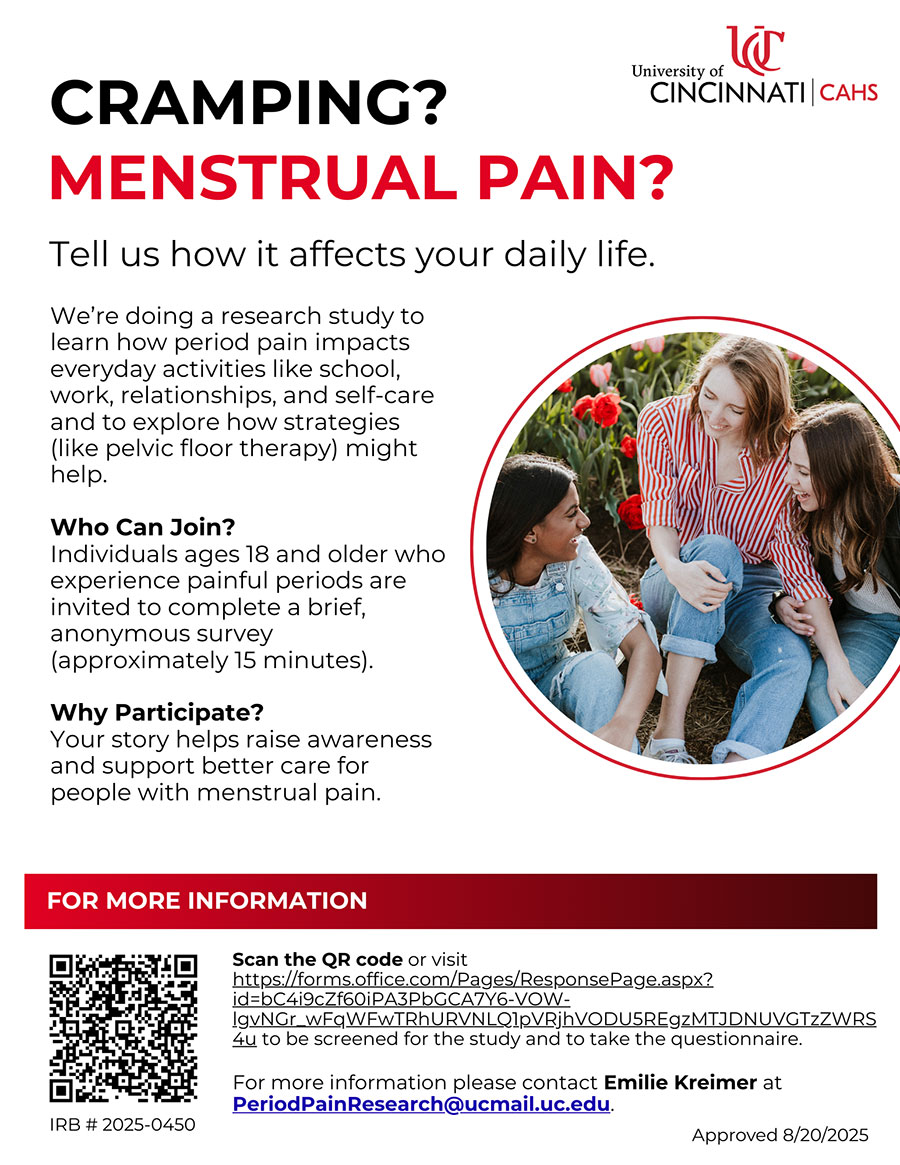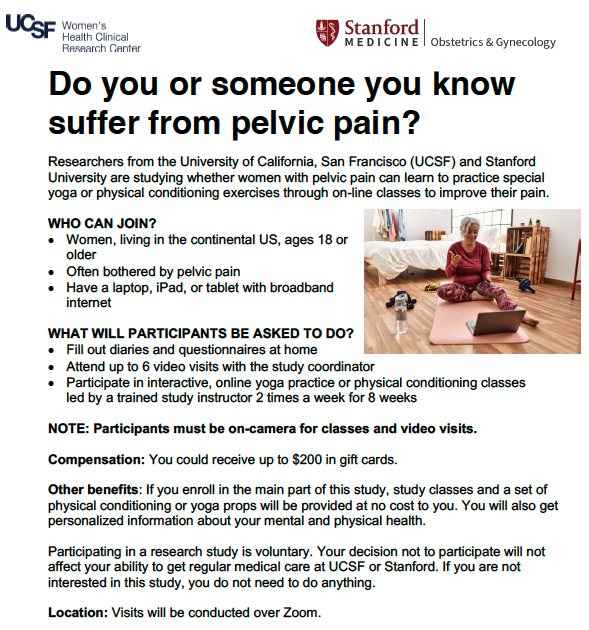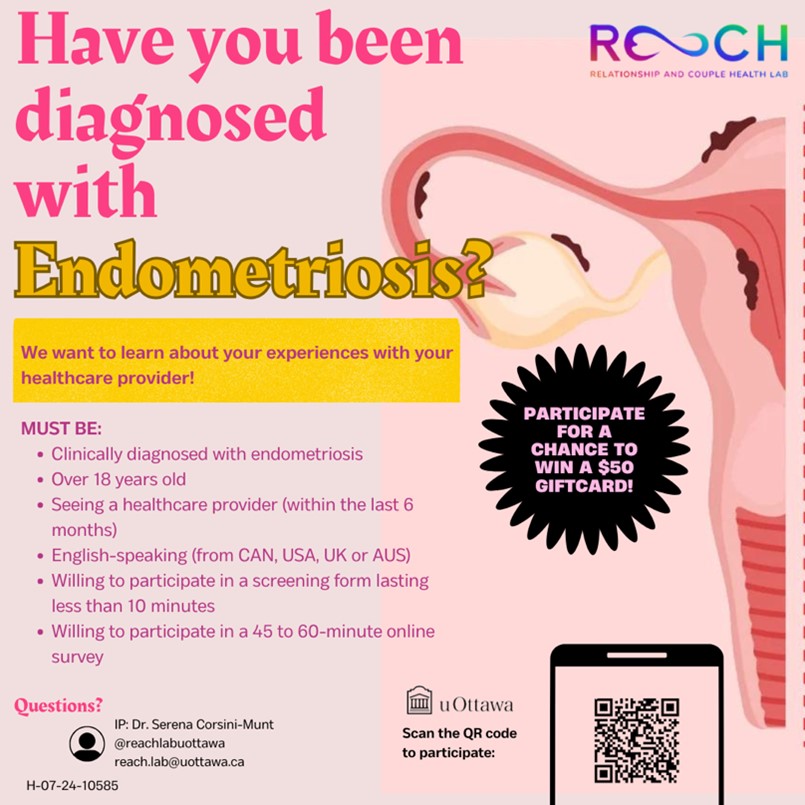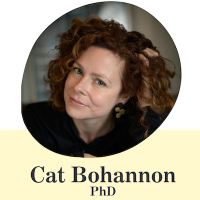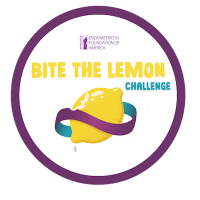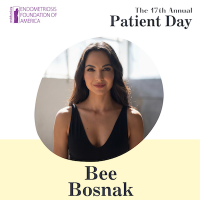Research volunteers are critical to advancing our understanding of endometriosis. Individuals with endometriosis and family members may be eligible to participate in research studies. EndoFound lists current opportunities to participate in studies that we have been informed of. To learn more about how to participate in clinical studies for endometriosis, please read our beginner's guide to participating in endometriosis clinical trials.
Endometriosis Clinical Trial

Purpose: Despite recent increases in both medical and recreational cannabis in the United States and globally, little research has been conducted to determine the potential applications for women’s health. Specifically, a variety of medical cannabis and hemp-derived products on the marketplace claim to hold efficacy for many women’s health-related conditions, such as dysmenorrhea, endometriosis, painful intercourse, and menopause-related symptoms. This research project is approved by the Institutional Review Board at Mass General Brigham and led by Dr. Staci Gruber at McLean Hospital in Belmont, MA, and plans to enroll participants through June 2026.
Volunteers interested in participating are:
- Individuals living with endometriosis who are interested in trying a cannabinoid-based sublingual product for treating endometriosis symptoms, including pain, gastrointestinal issues, and mood/anxiety
- Over the age of 21
- Fluent in English
- Able to provide informed consent
- Not currently pregnant or planning to be pregnant
Process: This study is a 12-week clinical trial of a high-cannabidiol (CBD) sublingual product compared to placebo in individuals with endometriosis. Participants will be pre-screened by phone to determine eligibility. If approved, participants will come to the hospital for a baseline visit, and will complete a clinical interview, questionnaires, medical screening, saliva and urine samples, blood draw, and two paper-and-pencil tasks. Follow up visits will occur every 2 weeks throughout the treatment period. Some visits can be completed entirely remotely, while other visits are completed in person at McLean Hospital.
Contact: Please visit the study’s recruitment for more information about this clinical trial: https://rally.
Endometriosis Survey Study
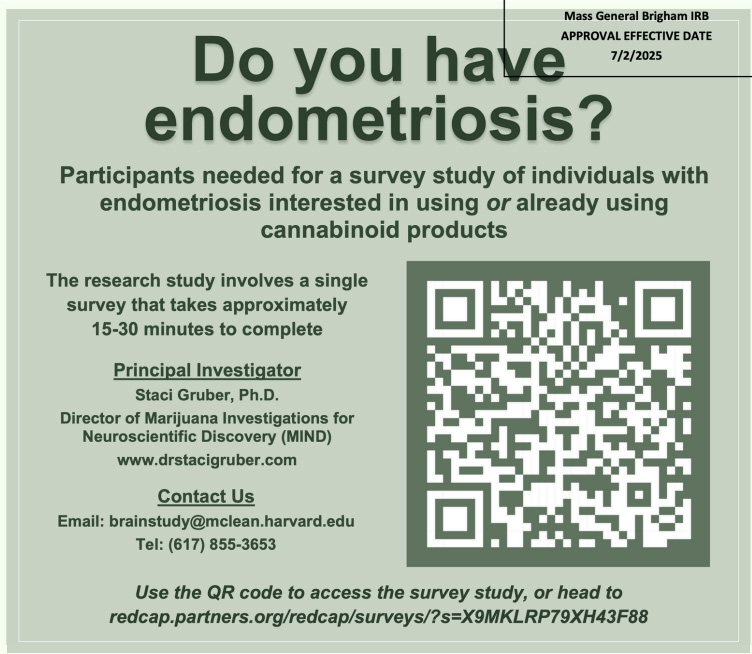
Purpose: Little is known regarding the goals and objectives of cannabinoid use in endometriosis patients, as well as perceptions and outcomes related to cannabinoid use. This observational survey study will assess the motives, outcomes, and expectancies in patients who are interested in cannabinoid use or who currently use cannabinoids for endometriosis symptoms. This project will collect data that does not currently exist regarding the potential goals of cannabinoid use in this population. This research project is approved by the Institutional Review Board at Mass General Brigham and led by Dr. Staci Gruber at McLean Hospital in Belmont, MA, and plans to enroll participants through December 2026.
- Volunteers interested in participating are:
- Individuals living with endometriosis
- Interested in cannabinoid use or currently using cannabinoid products for endometriosis
- Over the age of 21
- Able to provide informed consent
Process: This research study involves a single survey that takes approximately 15-30 minutes to complete. The survey can be accessed here: https://redcap.link/
Contact: Please visit the study’s recruitment for more information about this survey study: https://rally.
Understanding Social Media and Endometriosis
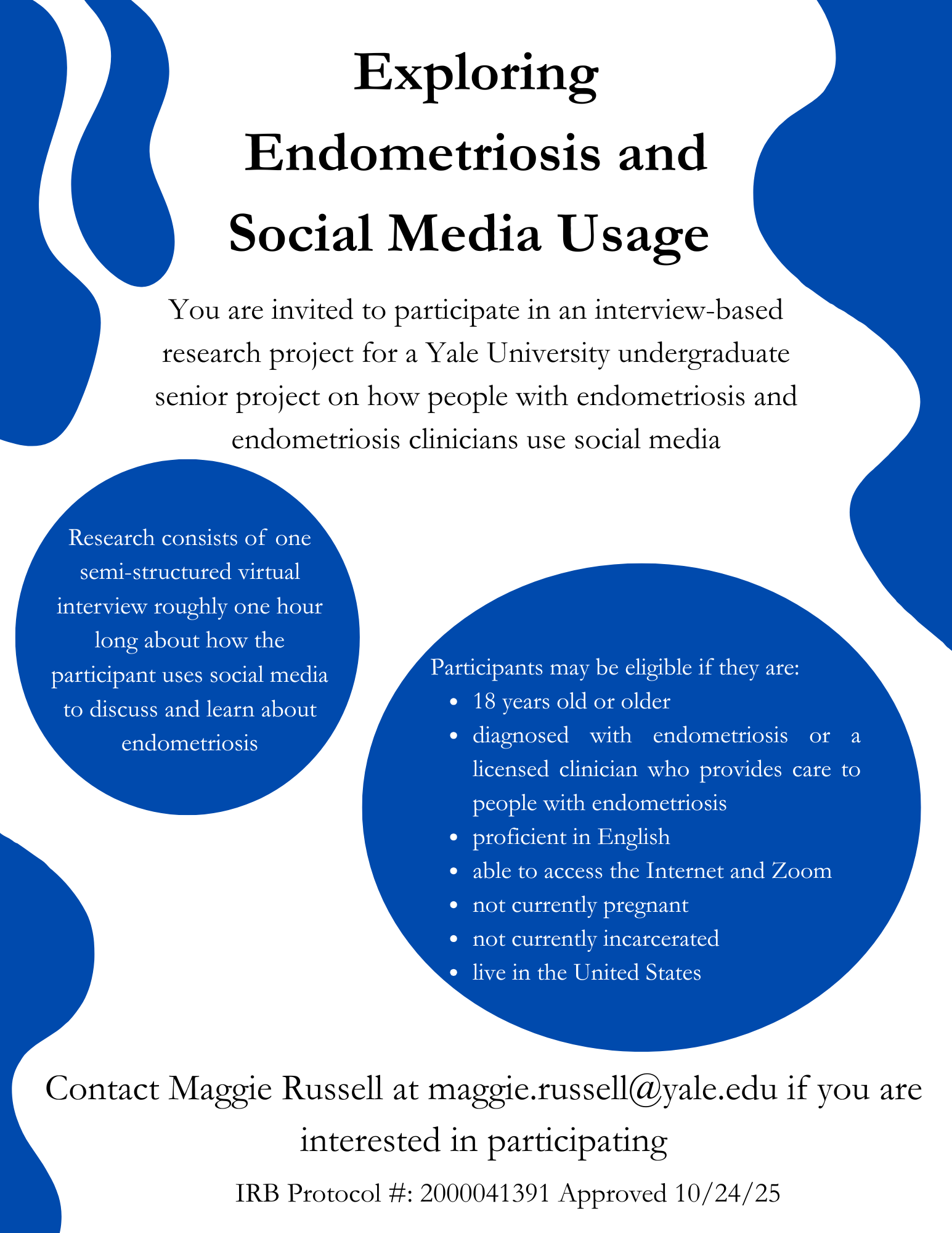
Purpose: The purpose of this study is to explore how people with endometriosis and endometriosis clinicians use social media to discuss endometriosis, find support, and educate each other. Understanding how and why both groups turn to social media may reveal gaps in clinical care and inform ways to improve patient-clinician relationships when navigating a chronic illness such as endometriosis. This research project was reviewed by the Institutional Review Board at Yale University and plans to enroll participants through March 4, 2026.
You may be eligible if you are:
- 18 years old or older
- Diagnosed with endometriosis or a licensed clinician who provides care to people with endometriosis
- Proficient in English and live in the United States
- Able to access the Internet and Zoom
- Not currently pregnant
- Not currently incarcerated
Process: Research consists of one semi-structured virtual interview roughly one hour long about how the participant uses social media to discuss and learn about endometriosis.
Contact: Please contact the principal investigator of this study, Maggie Russell, via email at maggie.russell@yale.edu if you have any questions or would like to participate!
A Portrait of Dysmenorrhea & Pelvic Floor Therapy
Researchers at the University of Cincinnati are studying how menstrual pain and cramping (dysmenorrhea) impact everyday life, work/school participation, and wellbeing—and exploring experiences with pelvic floor therapy and self-management strategies.
-
Age 18 or older
-
English speaker living in the United States
-
Experience menstrual pain or cramping (dysmenorrhea), with or without a formal diagnosis
The survey will take about 10 minutes. The first question includes an information sheet about the study. The survey then begins with multiple-choice questions, “select all that apply” items, and a few open-ended questions. Your responses are confidential and anonymous. Participation is voluntary and you may stop at any time.
Thank you for your interest!
National Program to Overcome Pelvic Pain Study (POPPY)
Researchers from the University of California, San Francisco (UCSF) are conducting a study to see whether women with pelvic pain can learn to practice special yoga or physical conditioning exercises to improve their pain.
You may be eligible to participate in the study if:
- You are a woman, 18 years or older, living in the continental United States.
- You experience chronic or frequent pelvic pain.
- You have access to a video-enabled electronic device (e.g., iPad, tablet, laptop, computer) for attending online classes, with on-camera participation required.
If you qualify for the study, you may:
- Complete diaries and questionnaires
- Participate in special interactive, online yoga or physical conditioning classes twice weekly for 8 weeks.
You will be modestly compensated for your time and receive yoga or physical conditioning props to use during free study classes and home practice.
If you are interested, please contact the Study Coordinator at pelvicpainstudy@ucsf.edu.
Endo Healthcare Study
Purpose:
- Explore how healthcare experiences can contribute to pain and psychosocial well-being for people with endometriosis
- Understand whether empathy from a healthcare provider contributes to these experiences
- Investigate how traumatic and discriminating healthcare experiences play a role in pain and psychosocial well-being
Eligibility:
- Diagnosed with endometriosis
- English speaking
- Over the age of 18 years old
- Located in Canada, USA, United Kingdom, or Australia
Process: First, you’ll be asked to complete a short screening form to express your interest and assess your eligibility. If eligible, you will be sent a secure link via email to a one-time online questionnaire, taking approximately 45-60 minutes to complete. These links will be embedded with an ID number that will be used to keep your data anonymous. Surveys can be completed on your mobile phone, laptop, or tablet.
Complete our screening form my scanning the QR code in the poster or following this link:
https://uottawapsy.az1.qualtrics.com/jfe/form/SV_9sKghKAV7z5Fd5k
Please contact our research team at reach.lab@uottawa.ca with any questions or comments!
Ovarian Hormone Suppression & Cognition (OHS) Study
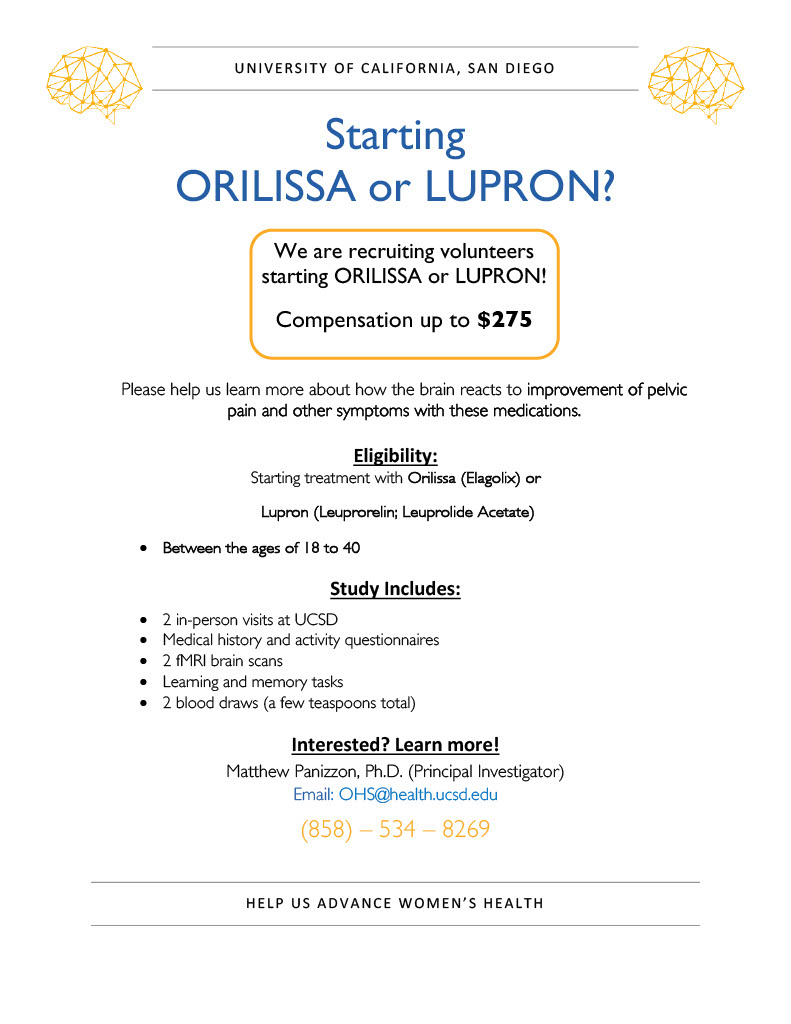
Purpose: The goal of the study is to examine the impact of ovarian hormone suppression treatments on the brain and cognition. Our participants are typically women with endometriosis and/or PCOS, and are starting medications like Elagolix/Orilissa, Lupron, Letrozole, Oriahnn or Myfembree. Assessments are conducted prior to the start of these medications, and then again, several months into their treatment. The study is funded by the National Institute on Aging. To be clear, this is NOT a clinical trial. Rather this is only an observational study that will not interfere in any way with the treatments you are given by your physicians. The study is run jointly by researchers at UC San Diego and UC Santa Barbara
Eligibility & Participation Criteria:
- Women 19–45 years old who:
- Are premenopausal
- Starting medications of hormone suppression (includes Elagolix/Orilissa, Letrozole/Femara, Lupron, Oriahnn, & Myfembree)
Time Commitment for Participant: UC San Diego La Jolla School of Medicine campus or UC Santa Barbara campus
- Women will be brought in for a study visit before starting hormone therapy and again 1-3 months after beginning treatment.
- Participation requires 2 visits to either site. We provide free parking, breakfast/lunch at your visit, pay gas mileage for those traveling 15-20 miles or greater one way and provide compensation for completing the study.
Contact: ohs@health.ucsd.edu
Principal Investigators: Matthew S. Panizzon, PhD & Emily G. Jacobs, PhD
Post Date: June 7, 2023
The ROSE Study
Purpose: A team of committed Feinstein Institute researchers and professionals are conducting the Research OutSmarts Endometriosis (ROSE) study. The goal of the ROSE study is to investigate the causes of endometriosis and bring improved diagnostics and treatments for women with endometriosis. More information on the recent work the research team has uncovered can be found here.
Time Commitment for Participant: Variable. Approximately 2-4hrs (telephonic screening and online paperwork)
Principal Investigator Contact and Institution: Feinstein Institute for Medical Research 516-562-3636
Citizen Endo
Purpose: The goal of the Citizen Endo project is to bridge the gap between what endometriosis patients actually experience and how doctors characterize the disease. As such, we aim to phenotype endometriosis according to patient's reports of their disease. This will help identify different sub-types of endometriosis. Researchers have already found that there is more than one phenotype of endometriosis by looking at histological samples from excised lesions, but these phenotypes do not correlate with disease stage or symptom severity. Through our app Phendo, a research and self-management smartphone app for endometriosis patients to self-track their symptoms, we collect data on how patients experience the disease day to day. With this data we can begin to identify similar groups of patients based on shared signs and symptoms. Having this information will ultimately enable better understanding of the disease and identifying more precise treatment and self-management strategies for women with endometriosis. More information can be found here.
Phendo App is available for both IOS and Android:
iOS: https://itunes.apple.com/us/ap
Contact:
citizenendo@columbia.edu
Department of Biomedical Informatics
Columbia University Medical Center
NextGenJane
Purpose: NextGen Jane is developing a smart tampon that will hopefully be able to diagnose endometriosis from menstrual fluid extracts. Endometriosis is currently diagnosed via diagnostic laparoscopic surgery; adenomyosis, by imaging. NextGen Jane is working on a way to look for molecular signals in the endometrial lining you shed naturally, every month, as an alternative to surgery or imaging for detecting disease. More information can be found here.
Contact: research@nextgenjane.com
Disclaimer:
Information on EndoFound.org is provided by study sponsors and investigators, and they are responsible for ensuring that the studies follow all applicable laws and regulations. Choosing to participate in a study is an important personal decision. Before you participate in a study, know the risks and potential benefits and discuss all options with your health care provider and other trusted advisors.
For more information about using the information on EndoFound.org please see Privacy Policy and Terms of Use.



